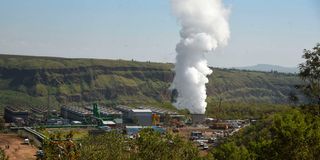Premium
Treasury signs support for Sh15.24bn Menengai geothermal plant

The 35MW geothermal power plant in Menengai, Nakuru County.
UK-based energy firm Globeleq has secured a letter of support from the Kenyan government for its 35-megawatt geothermal power plant project in Menengai, Nakuru.
A letter of support insulates a private investor from certain elements of country and political risk (and by extension, the investor's lenders) where, upon entering into a deal with a government entity, it is unable to perform its obligations under the contract due to the occurrence of a political event.
The support allows the firm to secure funding, handing a major boost to the project that has been delayed for more than seven years. The Menengai project was to be commissioned in 2016 but faced delays partly due to the failure to secure critical government support to enable independent power producers to get loans to build the plants.
The firm started building the power plant early this month and had announced that the project would "reach financial close within the next two to three weeks, subject to the remaining conditions precedent being fulfilled by the government".
"The letter of support, which is supposed to be provided for Globeleq has already been signed by the National Treasury," Geothermal Development Company (GDC) managing director Paul Ngugi told Nation.
"We see that the current government is unlocking the barriers that were there."
Globeleq was founded in 2002. British International Investment (BII) (formerly CDC) owns a 70 per cent stake in the firm while Norwegian development financier Norfund owns a 30 per cent stake.
The firm holds a majority stake in Quantum Power East Africa, one of the three developers who were awarded build-own-operate contracts for 35 megawatts of geothermal power plants totalling 105 megawatts in Menengai.
The others are Sosian Menengai Geothermal Power Limited and Orpower Twenty-Two Limited.
Steam will be supplied to the project by GDC under a 25-year implementation and supply agreement.
Globeleq also signed a 25-year power purchase agreement with Kenya Power and picked Japanese firm Toyota Tsusho Corporation as the EPC contractor for the project and Fuji Electric as the manufacturer and supplier of the steam turbine and generator.
The construction of the power plant is expected to conclude in mid-2025.
Globeleq late last year announced the signing of a $72 million (Sh10.16 billion) financing agreement with the African Development Bank, the Eastern and Southern African Trade and Development Bank, and Finnfund for the project.
Kenya is stepping up geothermal energy output and retiring costly diesel power plants.
Kenya Power Kenya Power last week said it would not renew the power purchase agreements(PPAs) for KenGen's 73.5-megawatt Kipevu I diesel-powered plant and the 60-megawatt gas turbine facility in Muhoroni when their current contracts expire later in the year—joining two other privately owned diesel plants that have faced a similar fate.
Kenya Power's PPA with the privately-owned 52.5-megawatt Iberafrica Power plant will expire in the current financial year ending June 30. Another electricity producer, Tsavo Power, said last March it would decommission its 75-megawatt thermal power plant in Kipevu, Mombasa, following the expiry of its contract with Kenya Power. Tsavo signed a 20-year PPA with the utility in January 2000, which ended in September 2021.





